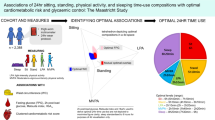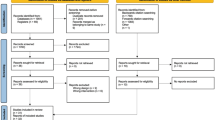Abstract
We examined whether screen time was associated with cardiometabolic disease (CMD) risk factors in young adults. Ninety-five adults (19.9 ± 11.4 years) self-reported medical and health behavior history, screen time (television viewing, video games and computer games), and dietary intake. Waist circumference, blood pressure, fasting glucose and lipid levels, cardiorespiratory fitness (VO2peak), and body composition were measured. Total sedentary behavior and moderate-to-vigorous physical activity (MVPA) were measured by accelerometer. On average, leisure screen time (2.0 ± 1.6 h day−1) accounted for 24% of total sedentary time (8.4 ± 1.5 h day−1). After adjustment for demographics, smoking, sleep duration, total energy intake, total sedentary time and MVPA, a 1-standard deviation increase in leisure screen time was associated with a 26% higher BMI, 29% higher waist circumference, 25% higher fat mass, 23% higher triglyceride, and 24% lower VO2peak (p < 0.05). Our findings suggest that screen time may contribute to the risk of obesity and CMD in young adults.

Similar content being viewed by others
References
American College of Sports Medicine. (2017). ACSM’s guidelines for exercise testing and prescription (10th ed.). Philadelphia: Wolters Kluwer.
Arts, J., Fernandez, M. L., & Lofgren, I. E. (2014). Coronary heart disease risk factors in college students. Advances in Nutrition, 5, 177–187. https://doi.org/10.3945/an.113.005447
Aspenes, S. T., Nilsen, T. I. L., Skaug, E.-A., et al. (2011). Peak oxygen uptake and cardiovascular risk factors in 4631 healthy women and men. Medicine & Science in Sports & Exercise, 43, 1465–1473. https://doi.org/10.1249/MSS.0b013e31820ca81c
Bachorik, P. S., & Ross, J. W. (1995). National cholesterol education program recommendations for measurement of low-density lipoprotein cholesterol: executive summary. The national cholesterol education program working group on lipoprotein measurement. Clinical Chemistry, 41, 1414–1420.
Bai, Y., Chen, S., Laurson, K. R., et al. (2016). The associations of youth physical activity and screen time with fatness and fitness: The 2012 NHANES National Youth Fitness Survey. PLoS ONE, 11, e0148038. https://doi.org/10.1371/journal.pone.0148038
Biddle, S. J. H., García Bengoechea, E., & Wiesner, G. (2017). Sedentary behaviour and adiposity in youth: a systematic review of reviews and analysis of causality. International Journal of Behavioral Nutrition and Physical Activity, 14, 43. https://doi.org/10.1186/s12966-017-0497-8
Blair, S. N. (2009). Physical inactivity: the biggest public health problem of the 21st century. British Journal of Sports Medicine, 43, 1–2.
Blair, S. N., Kohl, H. W., Paffenbarger, R. S., et al. (1989). Physical fitness and all-cause mortality. A prospective study of healthy men and women. JAMA, the Journal of the American Medical Association, 262, 2395–2401. https://doi.org/10.1001/jama.262.17.2395
Bureau of Labor Statistics (2018) American Time Use Survey—2017 Results. Washington, DC.
Cabanas-Sánchez, V., Martínez-Gómez, D., Esteban-Cornejo, I., et al. (2019). Associations of total sedentary time, screen time and non-screen sedentary time with adiposity and physical fitness in youth: the mediating effect of physical activity. Journal of Sports Sciences, 37, 839–849. https://doi.org/10.1080/02640414.2018.1530058
Carnethon, M. R., Gidding, S. S., Nehgme, R., et al. (2003). Cardiorespiratory fitness in young adulthood and the development of cardiovascular disease risk factors. JAMA, 290, 3092. https://doi.org/10.1001/jama.290.23.3092
Choi, L., Liu, Z., Matthews, C. E., & Buchowski, M. S. (2011). Validation of accelerometer wear and nonwear time classification algorithm. Medicine and Science in Sports and Exercise, 43, 357–364. https://doi.org/10.1249/MSS.0b013e3181ed61a3
Dale, R. A., Jensen, L. H., & Krantz, M. J. (2008). Comparison of two point-of-care lipid analyzers for use in global cardiovascular risk assessments. Annals of Pharmacotherapy, 42, 633–639. https://doi.org/10.1345/aph.1K688
de la Motte, S. J., Welsh, M. M., Castle, V., et al. (2019). Comparing self-reported physical activity and sedentary time to objective fitness measures in a military cohort. Journal of Science and Medicine in Sport, 22, 59–64. https://doi.org/10.1016/J.JSAMS.2018.05.023
Erez, A., Kivity, S., Berkovitch, A., et al. (2015). The association between cardiorespiratory fitness and cardiovascular risk may be modulated by known cardiovascular risk factors. American Heart Journal, 169, 916–923.e1. https://doi.org/10.1016/j.ahj.2015.02.023
Garcia, J. M., Duran, A. T., Schwartz, J. E., et al. (2019). Types of sedentary behavior and risk of cardiovascular events and mortality in Blacks: The Jackson Heart Study. Journal of the American Heart Association, 8, e010406. https://doi.org/10.1161/JAHA.118.010406
Grøntved, A., Ried-Larsen, M., Møller, N. C., et al. (2014). Youth screen-time behaviour is associated with cardiovascular risk in young adulthood: The European Youth Heart Study. European Journal of Preventive Cardiology, 21, 49–56. https://doi.org/10.1177/2047487312454760
Gropper, S. S., Simmons, K. P., Connell, L. J., & Ulrich, P. V. (2012a). Weight and body composition changes during the first three years of college. Journal of Obesity. https://doi.org/10.1155/2012/634048
Gropper, S. S., Simmons, K. P., Connell, L. J., & Ulrich, P. V. (2012b). Changes in body weight, composition, and shape: A 4-year study of college students. Applied Physiology, Nutrition and Metabolism, 37, 1118–1123. https://doi.org/10.1139/H2012-139
Hales, C. M., Carroll, M. D., Fryar, C. D., & Ogden, C.L. (2017). Prevalence of obesity among adults and youth : United States, 2015–2016. Hyattsville.
Hu, F. B., Li, T. Y., Colditz, G. A., et al. (2003). Television watching and other sedentary behaviors in relation to risk of obesity and type 2 diabetes mellitus in women. JAMA, 289, 1785. https://doi.org/10.1001/jama.289.14.1785
Ioachimescu, A. G., Brennan, D. M., Hoar, B. M., & Hoogwerf, B. J. (2010). The lipid accumulation product and all-cause mortality in patients at high cardiovascular risk: A preCIS database study. Obesity, 18, 1836–1844. https://doi.org/10.1038/oby.2009.453
Kahn, H. S. (2005). The lipid accumulation product performs better than the body mass index for recognizing cardiovascular risk: A population-based comparison. BMC Cardiovasc Disord, 5, 26. https://doi.org/10.1186/1471-2261-5-26
Kahn, H. S. (2006). The lipid accumulation product is better than BMI for identifying diabetes: A population-based comparison. Diabetes Care, 29, 151–153. https://doi.org/10.2337/diacare.29.1.151
Kozey-Keadle, S., Libertine, A., Lyden, K., et al. (2011). Validation of wearable monitors for assessing sedentary behavior. Medicine and Science in Sports and Exercise, 43, 1561–1567. https://doi.org/10.1249/MSS.0b013e31820ce174
Lloyd-Jones, D. M., Leip, E. P., Larson, M. G., et al. (2006). Prediction of lifetime risk for cardiovascular disease by risk factor burden at 50 years of age. Circulation, 113, 791–798. https://doi.org/10.1161/CIRCULATIONAHA.105.548206
Mandsager, K., Harb, S., Cremer, P., et al. (2018). Association of cardiorespiratory fitness with long-term mortality among adults undergoing exercise treadmill testing. JAMA Network Open, 1, e183605. https://doi.org/10.1001/jamanetworkopen.2018.3605
National Cholesterol Education Program ATP III. (2002). Third report of the National Cholesterol Education Program (NCEP) expert panel on detection, evaluation, and treatment of high blood cholesterol in adults (Adult Treatment Panel III) final report. Circulation, 106, 3143–3421.
Peterson, N. E., Sirard, J. R., Kulbok, P. A., et al. (2015). Validation of accelerometer thresholds and inclinometry for measurement of sedentary behavior in young adult university students. Research in Nursing & Health, 38, 492–499. https://doi.org/10.1002/nur.21694
Pinto Pereira, S. M., Ki, M., & Power, C. (2012). Sedentary behaviour and biomarkers for cardiovascular disease and diabetes in mid-life: the role of television-viewing and sitting at work. PLoS ONE, 7, e31132. https://doi.org/10.1371/journal.pone.0031132
Porter, A. K., Matthews, K. J., Salvo, D., & Kohl, H. W. (2017). Associations of physical activity, sedentary time, and screen time with cardiovascular fitness in United States adolescents: Results from the NHANES National Youth Fitness Survey. Journal of Physical Activity and Health, 14, 506–512. https://doi.org/10.1123/jpah.2016-0165
Rhodes, R. E., Mark, R. S., & Temmel, C. P. (2012). Adult sedentary behavior. American Journal of Preventive Medicine, 42, e3–e28. https://doi.org/10.1016/j.amepre.2011.10.020
Robergs, R. A., Dwyer, D., & Astorino, T. (2010). Recommendations for improved data processing from expired gas analysis indirect calorimetry. Sports Medicine (Auckland, N. Z.), 40, 95–111. https://doi.org/10.2165/11319670-000000000-00000
Rosenberg, D. E., Norman, G. J., Wagner, N., et al. (2010). Reliability and validity of the sedentary behavior questionnaire (SBQ) for adults. Journal of Physical Activity and Health, 7, 697–705.
Sasaki, J. E., John, D., & Freedson, P. S. (2011). Validation and comparison of ActiGraph activity monitors. Journal of Science and Medicine in Sport, 14, 411–416. https://doi.org/10.1016/J.JSAMS.2011.04.003
Saunders, T. J., Chaput, J.-P., & Tremblay, M. S. (2014). Sedentary behaviour as an emerging risk factor for cardiometabolic diseases in children and youth. Canadian Journal of Diabetes, 38, 53–61. https://doi.org/10.1016/j.jcjd.2013.08.266
Saunders, T. J., & Vallance, J. K. (2017). Screen time and health indicators among children and youth: Current evidence, limitations and future directions. Applied Health Economics and Health Policy, 15, 323–331. https://doi.org/10.1007/s40258-016-0289-3
Shephard, M. D. S., Mazzachi, B. C., & Shephard, A. K. (2007). Comparative performance of two point-of-care analysers for lipid testing. Clinical Laboratory, 53, 561–566.
Shibata, A. I., Oka, K., Sugiyama, T., et al. (2016). Physical activity, television viewing time, and 12-year changes in waist circumference. Medicine and Science in Sports and Exercise, 48, 633–640. https://doi.org/10.1249/MSS.0000000000000803
Sirard, J. R., Forsyth, A., Oakes, J. M., & Schmitz, K. H. (2011). Accelerometer test-retest reliability by data processing algorithms: results from the Twin Cities Walking Study. Journal of Physical Activity and Health, 8, 668–674.
Thorp, A. A., Healy, G. N., Owen, N., et al. (2010). Deleterious associations of sitting time and television viewing time with cardiometabolic risk biomarkers: Australian Diabetes, Obesity and Lifestyle (AusDiab) study 2004–2005. Diabetes Care, 33, 327–334. https://doi.org/10.2337/dc09-0493
Tran, D.-M. T., Zimmerman, L. M., Kupzyk, K. A., et al. (2017). Cardiovascular risk factors among college students: Knowledge, perception, and risk assessment. Journal of American College Health, 65, 158–167. https://doi.org/10.1080/07448481.2016.1266638
Young, D. R., Hivert, M.-F., Alhassan, S., et al. (2016). Sedentary behavior and cardiovascular morbidity and mortality: A science advisory from the American Heart Association. Circulation. https://doi.org/10.1161/CIR.0000000000000440
Acknowledgements
This study was funded by the National Institutes of Health, National Institute of General Medical Sciences, Mountain West Clinical Translational Research Infrastructure Network Grant 1U54GM104944-01A1. The authors would like to thank the participants who took part in this study as well as Devin Drummer, Kate Connor and the other dedicated researchers in the Exercise Physiology Research Laboratory for their assistance in data collection and processing.
Author information
Authors and Affiliations
Contributions
CV conceived and designed the study. All authors conducted experiments and analyzed data. CV wrote the manuscript and all authors critically edited the manuscript. All authors read and approved the manuscript.
Corresponding author
Ethics declarations
Conflict of interest
The authors report no conflict of interest.
Human and animal rights and Informed consent
All procedures followed were in accordance with the ethical standards of the responsible committee on human experimentation (institutional and national) and with the Helsinki Declaration of 1975, as revised in 2000 (5). Informed consent was obtained from all patients for being included in the study.
Additional information
Publisher's Note
Springer Nature remains neutral with regard to jurisdictional claims in published maps and institutional affiliations.
Rights and permissions
About this article
Cite this article
Vella, C.A., Taylor, K. & Nelson, M.C. Associations of leisure screen time with cardiometabolic biomarkers in college-aged adults. J Behav Med 43, 1014–1025 (2020). https://doi.org/10.1007/s10865-020-00161-2
Received:
Accepted:
Published:
Issue Date:
DOI: https://doi.org/10.1007/s10865-020-00161-2




